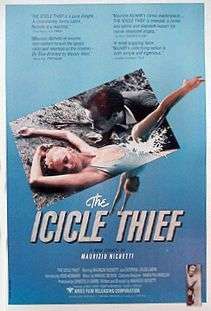The Icicle Thief
| The Icicle Thief | |
|---|---|
 Film poster | |
| Directed by | Maurizio Nichetti |
| Produced by | Ernesto Di Sabro |
| Written by |
Mauro Monti Maurizio Nichetti |
| Story by | Maurizio Nichetti |
| Starring |
|
| Music by | Manuel De Sica |
| Cinematography | Mario Battistoni |
| Edited by | Rita Rossi |
| Distributed by | Bambú, Reteitalia |
Release dates |
|
Running time | 90 minutes |
| Country | Italy |
| Language |
Italian English |
| Box office | $1,231,622 (domestic)[1] |
The Icicle Thief (Italian: Ladri di saponette) is a 1989 Italian comedy film directed by Maurizio Nichetti, titled in imitation of Vittorio De Sica's classic Italian neorealist film The Bicycle Thief (Italian: Ladri di biciclette). Some feel The Icicle Thief was created as a spoof of neorealism, which predominated Italian cinema after World War II. However, it is generally understood to go beyond this and to take a stand against commercialism as destructive towards art. The film won the Golden St. George at the 16th Moscow International Film Festival.[2]
Plot
The movie begins with an egotistical film director, played by director Maurizo Nichetti himself, discussing his latest film on an intellectual Italian TV channel which is about to broadcast it at short notice in place of a more highly regarded competitor’s. His "masterpiece" follows the bleak travails of a poverty-stricken unemployed man (again played by Nichetti) who finds work in a chandelier factory, but cannot resist stealing one of the gleaming lights for his wife. The pompous director is initially pleased with the seriousness with which his work is analysed, but he then becomes distraught when his black-and-white opus is repeatedly interrupted by full-colour commercials. The TV audience, watching in their homes, are completely oblivious of the interruptions and the "outrages" perpetrated on the director’s artistic intentions.
Finally, a power failure in the studio results in (colour) characters from the adverts appearing in the (black-and-white) film-within-a-film after the commercial breaks, and interacting with its protagonists, thus completely changing its plot and concept. The director himself is drawn into his own movie via the TV studio’s television set, and begins arguing with the characters.[3][4]
Wordplay translation
The film's Italian title Ladri di saponette, a play on the Italian title of De Sica's film, means "Soap Thieves"; it is justified by dialogue where a boy is told not to use up all the soap when washing his hands, and his mother wonders if he is eating it. For English-speaking audiences, the title was changed to The Icicle Thief, playing on the English title of De Sica's film. This title was justified by changing the wording of the English subtitles when the characters talk about some chandeliers and one is stolen. In the original Italian dialogue they are said to sparkle like pearls (pèrle) and drops of water (gocce), but in the English subtitles, they look "like icicles" (which in Italian would be ghiaccioli).
Critical reception
Reviewing the film for the Los Angeles Times, Sheila Benson wrote, "Bless the Italians and their obsession with movies. Having created a permanent niche in the hearts of the world's movie sentimentalists with Cinema Paradiso, they now let loose their secret weapon, writer-director-actor and comic extraordinaire, Maurizio Nichetti". She found The Icicle Thief to be an "ingenious comedy", adding, "Pirandello rarely did it better and in The Purple Rose of Cairo Woody Allen didn't get this nuttily complex", before concluding that the film is "a lot like its creator--slight, ingenious and sneakily irresistible".[5]
In The Washington Post, Desson Howe was less impressed, beginning by noting, "The TV thing, right? It slices our sense of reality into 15-minute chunks. Its commercials ruin the dramatic integrity of the programs they interrupt. It turns us into dumb couch potatoes. It gives us limited attention spans. I said it gives us limited attention spans. These and other TV-loathing observations, as most of us have asserted in everything from organized junior-high class discussions to alcohol-induced dorm-room rantings, are inarguably true. But in The Icicle Thief, a satirical fantasy about the way television butchers the movies it puts on, Italian film director Maurizio Nichetti 'discovers' these insights as though for the first time". Howe goes on, "The parts of Icicle […] that bash the boob tube comprise the film's least enlightening elements; they're facile, almost sophomoric. […] But the parts which reveal, without self-conscious underlinings, the trashy TV culture in which we live, as well as the TV commercial switcheroos, are where it's worth watching". Overall, however, Howe concluded that: "things become a little too convoluted and Icicle joins that crowded group of Italian movies with an apparent inability to understand the concept of excess. But, as with many such films, the inner spirit frequently carries you over, and although Nichetti tells us practically nothing new about the global village, he certainly has fun with the possibilities".[6]
As of 15 October 2015, The Icicle Thief had a rating of 7.1/10 (from 786 users) on the Internet Movie Database (IMDb).[7]
References
- ↑ http://www.boxofficemojo.com/movies/?id=iciclethief.htm
- ↑ "16th Moscow International Film Festival (1989)". MIFF. Retrieved 2013-02-24.
- ↑ James, Caryn (1990) "The Icicle Thief (1989)", New York Times, August 24, 1990. Retrieved 11 Sept. 2014
- ↑ Michael Brooke (no date). “The Icicle Thief (1989) Plot Summary”, IMDb (no date). Retrieved 12 Sept. 2014
- ↑ Benson, Sheila (7 September 1990). "MOVIE REVIEW: 'Icicle Thief' an Ingenious Parody". Los Angeles Times. Los Angeles. Retrieved 15 October 2015.
- ↑ Howe, Desson (7 September 1990). "'The Icicle Thief' (NR)". The Washington Post. Washington D.C. Retrieved 15 October 2015.
- ↑ "The Icicle Thief (1989)". IMDb. Retrieved 15 October 2015.
External links
- The Icicle Thief at the Internet Movie Database
- The Icicle Thief at Box Office Mojo
- The Icicle Thief on moria.co.nz